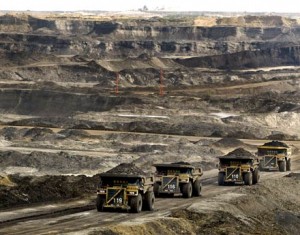Submitted by James Miller from the Ludwig von Mises Institute of Canada
Canada Oil Sands And The Precautionary Principle
 The precautionary principle is typically defined as “if an action or policy has a suspected risk of causing harm to the public or to the environment, in the absence of scientific evidence that the action or policy is harmful, the burden of proof that it is not harmful falls on those taking the action.” In practice, the principle is utilized by government policy makers to ensure technological advances don’t pose too dire of an effect on the surrounding environment. This may appear a noble goal if one accepts the premise that the prime function of government is the protection of life and property. History proves otherwise as easily corruptible politicians have tended to grant exceptions to wealthy business interests which look to dump their waste in public-owned natural resources such as waterways. It is also clear judging by historical cases that socialization often results in environmental degradation. One look at the pollution in once-communist nations such as China or the former Soviet Union reveals that a lack of private property results in a type of moral hazard en masse as there is little incentive to preserve what you don’t officially own.
The precautionary principle is typically defined as “if an action or policy has a suspected risk of causing harm to the public or to the environment, in the absence of scientific evidence that the action or policy is harmful, the burden of proof that it is not harmful falls on those taking the action.” In practice, the principle is utilized by government policy makers to ensure technological advances don’t pose too dire of an effect on the surrounding environment. This may appear a noble goal if one accepts the premise that the prime function of government is the protection of life and property. History proves otherwise as easily corruptible politicians have tended to grant exceptions to wealthy business interests which look to dump their waste in public-owned natural resources such as waterways. It is also clear judging by historical cases that socialization often results in environmental degradation. One look at the pollution in once-communist nations such as China or the former Soviet Union reveals that a lack of private property results in a type of moral hazard en masse as there is little incentive to preserve what you don’t officially own.
Rather than enforce property rights, the state systematically violates them in order to buttress its dominating hold over society and reward its supporters. What the precautionary principle has resulted in is further discretion over economic affairs given over to those public officials who take great delight in micro-managing the lives of others. The stifled progression in technology and industrialization that is a consequence of the precautionary practice is the insidious but sincere goal of its enthusiasts.
Presently, there exists no greater threat to the green movement than that of cheap fossil fuels. Drilling for oil is demonized in Western media. The prospect of extracting massive amounts of natural gas in North America has ignited numerous environmental protests. In Canada, the mining of oil sands has become a target of the federal government. During a recent trip to survey the ongoing mining operation taking place in Alberta, Leader of the Official Opposition (the New Democratic Party) Thomas Mulcair admitted that while he was impressed by the “awe-inspiring” scale though which human-made machines and ingenuity were extracting this unconventional petroleum deposit, he was still wary of the potential environmental damage such an industrial breakthrough could present. From the Globe and Mail:
Precisely one thing surprised Thomas Mulcair on his visit to Alberta: the scale of the oil sands.
During his first visit, including a helicopter flight over several oil sands mines, to a region he has criticized, Mr. Mulcair was overwhelmed by the “awe-inspiring” display.
“These are extraordinary undertakings on a human scale. I mean, they’re massive,” Mr. Mulcair said. “It’s extraordinarily impressive, but it also brings with it real challenges. Real challenges that if we don’t assume in this generation, we’re going to bear in future generations.”
Admittedly, environmental damage can be devastating to those private property owners affected. This is why tort law and criminal charges are brought to assaulters and those who trespass or willingly destroy private property. No amount of general prosperity that could develop through industrialization is an excuse to waive the blatant destruction of privately owned property. When Professor Ludwig von Mises spoke to private property being “inextricably linked with civilization,” he referred to the conservation tendency property owners tend to develop. In order for man to be forward-looking, he has to have some expectation of improving his current lot. This generally means control over that land and material goods he possesses. There is little incentive to invest time and capital without full ownership as any other interested party could come along and consume whatever resources are readily available. The “tragedy of the commons” principle is why shared ownership of land or worker communes never last for significant periods of time.
The respect to private property is what ultimately drives capital accumulation and the employing of factors of production for more intricate or grand-in-scale industrial undertakings. Just as people are limited by their ability to economically calculate and profit off of the unknowable future, it can be difficult to account for engineering mistakes. Humans are imperfect; accidents happen. What the precautionary principle does in practice is put government-enforced barriers in front of what could be great advances in industrialization.
And this is precisely what many environmentalists want.
Man develops machinery to raise his standard of living. He takes risk in search of reward. If success were assured, we would all be industrialists. The broad use of the precautionary principle necessarily prevents innovation. If more politicians like Mulcair were around in the 19th century, it is likely that the first rail road tracks would have never been laid. The same goes for the growth in the widespread use of cars and airplanes. Even fire, which can cause great harm if left uncontrolled, would have never been allowed extensive usage if the precautionary principle were adhered to in caveman times. As investor Doug Casey observers in regard to the principle:
If our ancestors had even been stupid enough to adopt such an absolutely paralyzing idea, we’d still be shivering in caves, ravaged by dread diseases and hunted by animals larger and more powerful than we. No, I misspeak; most likely, we’d have gone extinct.
What the green movement hates is not pollution but humanity itself. Its followers would rather see humans beholden to nature than conquer the deprivation the complete natural world holds for mankind. It is communal authoritarianism disguised as moral sustainability. The greens don’t look forward to a life of ease but only backwards to the days when man eked out a day to day existence while always on the verge of death. They want humans to devolve to the state of irrational apes and eventually die out. As Rothbardian philosopher David Gordon puts it:
Some environmentalists are outright enemies of humanity, who favor a drastic reduction in human population, if not the elimination altogether of our species.
According to a recent study conducted by economists Robert P. Murphy and Brian Lee Crowley, the petroleum industry in Canada “showers benefits across the provinces, and provides outlets for manufactured goods.” The extraction of petroleum deposits from the oil sands promises to both create employment and boost economic output across the nation. As long as the companies which engage in extraction are held liable for whatever damage they cause to private lands not under their contractual ownership, Canadians should welcome this technological innovation.
In the end, the raising of living standards is only made possible by industrial advances that require a preference of future betterment over present bliss. Private property is the only means to aid in such endeavors. This is why the green movement never lobbies for abolition of “public” property or stricter enforcement of property protection. Its efforts are aimed at building up the nanny state along with stalling real progress.
Environmentalists who look to the state to enforce their visions of paradise are really just admirers of slavery. Freedom of human will means risk taking and pioneering better methods to improve life on Earth. It means creating a future of ease and contentment.
There is a stark difference between defending private property and environmentalism which advocates for little to no actual developments in industrial production. Proponents of the former are grateful to sleep on a mattress instead of a dirt floor. Proponents of the latter, especially politicians like Thomas Mulcair, want to see mankind emaciated, bowed down before them, and entirely submissive like a back alley mutt that has been kicked hard in gut all too many times.










